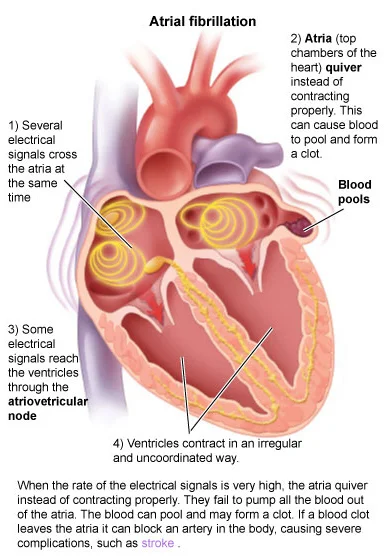By Dr. Matthew Quin, Cardiac Electrophysiologist
Atrial fibrillation is a complex arrhythmia (abnormal heart rhythm) affecting the upper chambers of the heart (the atria) primarily. During atrial fibrillation, the atria beat very rapidly (over 300 beats per minute), and much of the pumping activity of this portion of the heart is lost. Additionally it drives the main pumping chambers of the heart (the ventricles) rapidly, and while the ventricles are unable to go as fast as the atria, pulse rates over 150 beats per minute are not uncommon.
What causes atrial fibrillation?
Atrial fibrillation usually does not have one single factor underlying the disease, although there are some instances where this is true (such as high thyroid levels). In most individuals, atrial fibrillation is a result of an inherited tendency (to some degree) as well as other factors; conditions such as high blood pressure, obesity or overweight, obstructive sleep apnea, diabetes mellitus, coronary heart disease, or heart failure are often associated with the development of atrial fibrillation. Depending on an individual's symptoms, each of these is assessed as part of the evaluation of atrial fibrillation.
What are the symptoms of atrial fibrillation?
In a minority of people, atrial fibrillation has no symptoms at all. However, many people adjust their level of activity in such a way as to minimize symptoms--these individuals restructure their activity to accommodate the disease. In most people, atrial fibrillation does lead to symptoms--most commonly fatigue, shortness of breath, a sensation of rapid heart beat, or chest pain. Occasionally symptoms such as lightheadedness (or rarely fainting) can be attributed to atrial fibrillation as well. These symptoms are largely related to the rapid heart beat caused by atrial fibrillation as well as the reduced pumping capability of the heart when atrial fibrillation starts.
There are other concerns beyond the symptoms associated with atrial fibrillation however; atrial fibrillation is one of the most common causes for strokes as well as heart failure. Because of the reduced pumping capability of the heart, blood tends to pool in small channels naturally located along the inside of the heart; when blood pools, it tends to form clots. If these blood clots then break free and escape into the blood stream then they can cause strokes if the blood clot goes to the brain. Blood clots going to other organs can lead to problems at those locations as well--even problems such as kidney disease and heart attacks. In addition to the risk of stroke, the rapid heart rates associated with atrial fibrillation can lead to heart failure, or a condition called "tachycardia-mediated cardiomyopathy". Reduction in the heart rate (and treatment of the underlying atrial fibrillation) is key in treating this condition.
What can be done about atrial fibrillation?
After evaluation for underlying conditions which may contribute to the development of atrial fibrillation, attention is focused on therapy. There are a variety of therapies available for atrial fibrillation, with the best therapy personalized for the symptoms, age and lifestyle of the individual. In some people, medications called anti-arrhythmic drugs are an effective means of suppression of atrial fibrillation. Some benefit from a simple procedure called a cardioversion, which is a shock administered to the heart to stop the abnormal rhythm and allow the body's normal rhythm to resume. In select individuals, atrial fibrillation can be treated directly with a procedure performed within the heart called an ablation, during which the triggers for atrial fibrillation are directly targeted and destroyed or isolated with a heated wire called a catheter. And finally, for some people a pacemaker provides a good option for control of symptoms related to atrial fibrillation; while a pacemaker does not eliminate atrial fibrillation, it can ameliorate many of the associated symptoms.
What is the long term prognosis?
With good medical care, atrial fibrillation is a condition that individuals live with, not die from. But ongoing therapy is important to prevent the complications mentioned above, but also because atrial fibrillation is associated with other adverse health outcomes such as dementia. Adherence to medications along with routine follow up with your physician is important for maintaining your health.

